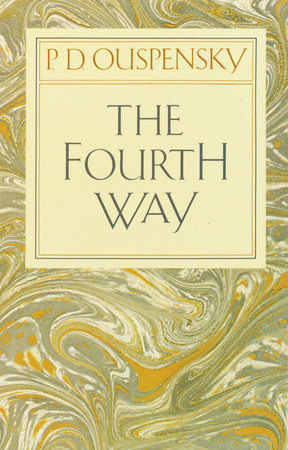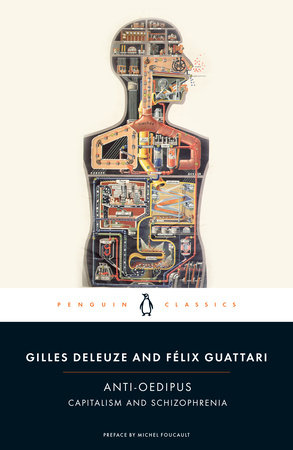

Anti-Oedipus
By Gilles Deleuze and Felix Guattari
Introduction by Mark Seem
Preface by Michel Foucault
Translated by Robert Hurley, Mark Seem and Helen R. Lane
By Gilles Deleuze and Felix Guattari
Introduction by Mark Seem
Preface by Michel Foucault
Translated by Robert Hurley, Mark Seem and Helen R. Lane
By Gilles Deleuze and Felix Guattari
Read by Jon Orsini
Introduction by Mark Seem
Preface by Michel Foucault
Translated by Robert Hurley, Mark Seem and Helen R. Lane
By Gilles Deleuze and Felix Guattari
Read by Jon Orsini
Introduction by Mark Seem
Preface by Michel Foucault
Translated by Robert Hurley, Mark Seem and Helen R. Lane
Category: Psychology | Classic Nonfiction | Economics
Category: Psychology | Economics | Audiobooks

-
$23.00
May 26, 2009 | ISBN 9780143105824
-
Dec 05, 2023 | ISBN 9780593862353
1287 Minutes
Buy the Audiobook Download:
YOU MAY ALSO LIKE
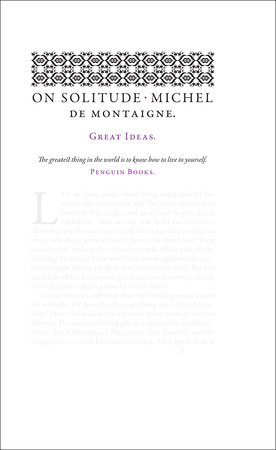
On Solitude

The Prince
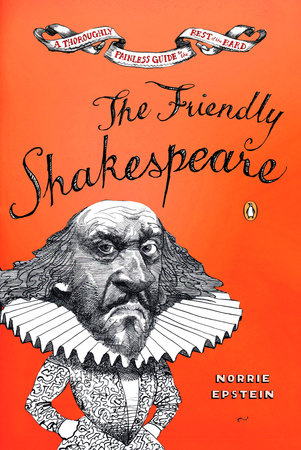
The Friendly Shakespeare
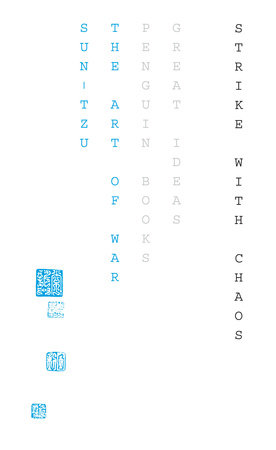
The Art of War
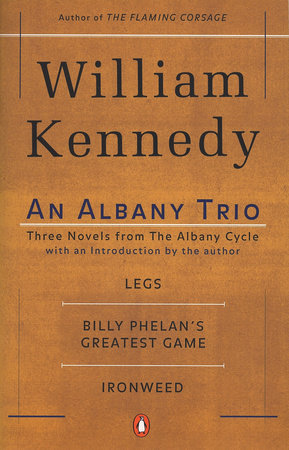
An Albany Trio
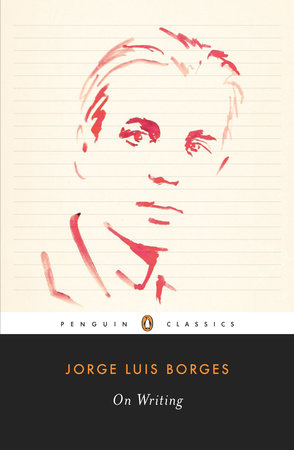
On Writing

How to Achieve True Greatness
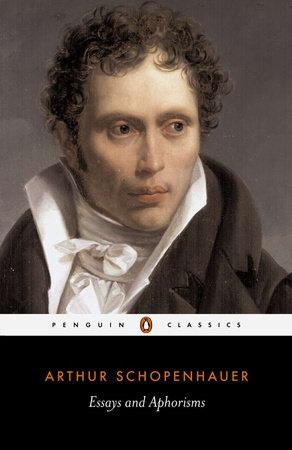
Essays and Aphorisms

The Needs of Strangers
Praise
” Renders palpable the metaphor of the unconscious as a worker, and does it in a brilliant, appropriately nutty way.”
–The New Republic
Table Of Contents
Preface by Michel Foucault
Introduction by Mark Seem
1. THE DESIRING-MACHINES
1. Desiring-Production
The schizo’s stroll ♦ Nature and industry ♦ The process ♦ Desiring-machine, partial objects and flows: and . . . and . . . ♦ The first synthesis: the connective synthesis or production of production ♦ The production of the body without organs ♦
2. The Body Without Organs
Abti-production ♦ Repulsion and the paranoiac machine ♦ Desiring-production and social production: how anti-production appropriates the productive forces ♦ Appropriation or attraction, and the miraculating-machine—The second synthesis: the disjunctive synthesis or production of recording ♦ Either . . . or . . . ♦ The schizophrenic genealogy ♦
3. The Subject and Enjoyment
The celibate machine ♦ The third synthesis: the conjunctive synthesis or production of consumption-consummation ♦ So it’s . . . ♦ Matter, egg, and intensities: I feel ♦ The names in history ♦
4. A Materialist Psychiatry
The unconscious and the category of production ♦ Theater or factory? ♦ The process as production process ♦ The idealist conception of desire as lack (fantasy) ♦ The real and desiring-production: the passive syntheses ♦ One and the same production, social and desiring ♦ The reality of the group fantasy ♦ The differences in regime between desiring-production and social production ♦ The socius and the body without organs ♦ Capitalism, and schizophrenia as its limit (the counteracted tendency) ♦ Neurosis, psychosis, and perversion ♦
5. The Machines
Desiring-machines are machines, no metaphor ♦ The first mode of break: flows and selection from flows ♦ The second mode: chains or codes, and detachments from them ♦ The third mode: subject and residue ♦
6. The Whole and Its Parts
The status of multiplicities ♦ The partial objects ♦ The critique of Oedipus, the Oedipal mystification ♦ Already the child . . . ♦ The orphan-conscious ♦ What is wrong with psychoanalysis? ♦
2. PSYCHOANALYSIS AND FAMILIALISM: THE HOLY FAMILY
1. The Imperialism of Oedipus
Its modes ♦ The Oedipal turning-point in psychoanalysis ♦ Desiring-production and representation ♦ The abandonment of the desiring-machines ♦
2. Three texts of Freud
Oedipalization ♦ The flattening-out of Judge Schreber’s delirium ♦ How pyschoanalysis is still pious ♦ The ideology of lack: castration ♦ Every fantasy is collective ♦ The libido as flow ♦ The rebellion of the flows ♦
3. The Connective Synthesis of Production
Its two uses, global and specific, partial and non-specific ♦ The family and the couple, filiation and alliance: triangulation ♦ The triangulation’s cause ♦ The first paralogism of psychoanalysis: extrapolation ♦ The transcendent use and the immanent use ♦
4. The Disjunctive Synthesis of Recording
Its two uses, exclusive and restrictive, inclusive, and nonrestrictive ♦ The inclusive disjunctions: genealogy ♦ The exclusive differentiations and the nondifferentiated ♦ The second paralogism of psychoanalysis: the Oedipal double-bind ♦ Oedipus wins at every turn ♦ Does the borderline pass between the Symbolic and the Imaginary?
5. The Conjunctive Synthesis of Consumption-Consummation
Its two uses, segregative and biunivocal, nomadic and polyvocal ♦ The body without organs and intensities ♦ Voyages, passages: I am becoming ♦ Every delirium is social, historical and political ♦ Races ♦ The meaning of identification ♦ How psychoanalysis suppresses sociopolitical content ♦ An unrepentant familialism ♦ The family and the social field ♦ Desiring-production and the investment of social production ♦ From childhood ♦ The third paralogism of psychoanalysis: Oedipus as a biunivocal "application" ♦ The disgrace of psychoanalysis with regard to history ♦ Desire and the infrastructure ♦ Segregation and nomadism ♦
6. A Recapitulation of the Three Syntheses
Oedipus would make fools of us all ♦ Oedipus and "belief" ♦ Meaning is use ♦ The immanent criteria of desiring-production ♦ Desire knows nothing of the law, lack, and the signifier ♦ "Were you born Hamlet . . . ? ♦
7. Social Repression and Psychic Repression
The law ♦ The fourth paralogism of psychoanalysis: the displacement, or the disfiguration of the repressed ♦ Desire is revolutionary ♦ The delegated agent of psychic repression ♦ It is not psychoanalysis that invents Oedipus ♦
8. Neurosis and Psychosis
Reality ♦ The inverse relation ♦ "Undecidable" Oedipus: resonance ♦ The meaning of actual factors ♦ The fifth paralogism of psychoanalysis: the afterward ♦ The actuality of desiring-production ♦
9. The Process
Leaving ♦ The painter Turner ♦ The interruptions of the process: neurosis, psychosis, and perversion ♦ The movement of deterritorialization and territorialities ♦
3. SAVAGES, BARBARIANS, CIVILIZED MEN
1. The Inscribing Socius
The recording process ♦ In what sense capitalism is universal ♦ The social machine ♦ The problem of the socius, coding the flows ♦ Not exchanging, but marking and being marked ♦ The investment and the disinvestment of organs ♦ Curelty: creating a memory for man ♦
2. The Primitive Territorial Machine
The full body of the earth ♦ Filiation and alliance: their irreducibility ♦ The village pervert and local groups ♦ Filiative stock and blocks of alliance debt ♦ Functional disequilibrium: surplus value of code ♦ It only works by breaking down ♦ The segmentary machine ♦ The great fear of decoded flows ♦ Death which rises from within, but comes from without ♦
3. The Problem of Oedipus
Incest ♦ The inclusive disjunctions on the full body of the earth ♦ From intensities to extension: the sign ♦ In what sense incest is impossible ♦ The limit ♦ The conditions of coding ♦ The in-depth elements of representation: the repressed representative, the repressing representation, the displaced represented ♦
4. Psychoanalysis and Ethnology
Continuation of the Oedipal problem ♦ A process of treatment in Africa ♦ The conditions of Oedipus and colonization ♦ Oedipus and ethnocide ♦ Those who oedipalize don’t know what they’re doing ♦ On what is psychic repression brought to bear? ♦ Culturalists and universalists: their common postulates ♦ In what sense Oedipus is indeed universal: the five meanings of limit, Oedipus as one of them ♦ Use, or functionalism in ethnology ♦ The desiring-machines do not mean anything ♦ Molar and molecular ♦
5. Territorial Representation
Its surface elements ♦ Debts and exchange ♦ The five postulates of the exchangist conception ♦ Voice, graphism, and eye: the theater of cruelty ♦ Nietzsche ♦ The death of the territorial system ♦
6. The Barbarian Despotic Machine
The full body of the despot ♦ New alliance and direct filiation ♦ The paranoiac ♦ Asiatic production ♦ The bricks ♦ The mystifications of the State ♦ Despotic deterritorialization and the infinite debt ♦ Overcoding the flows ♦
7. Barbarian or Imperial Representation
Its elements ♦ Incest and overcoding ♦ The in-depth elements and the migration of Oedipus: incest becomes possible ♦ The surface elements, the new voice-graphism relationship ♦ The transcendent object from on high ♦ The signifier as the deterritorialized sign ♦ The despotic signifier, and the signifieds of incest ♦ Terror, the law ♦ The form of the infinite debt: latency, vengeance, and ressentiment ♦ This is still not Oedipus . . . ♦
8. The Urstaat
A single State? ♦ The State as a category ♦ Beginning and origin ♦ The evolution of the State: becoming-concrete and becoming-immanent ♦
9. The Civilized Capitalist Machine
The full body of money-capital ♦ Decoding and the conjunction of decoded flows ♦ Cynicism ♦ Filiative capital and alliance capital ♦ The transformation of surplus value of code into a surplus value of flux ♦ The two forms of money, the two inscriptions ♦ The falling tendency ♦ Capitalism and deterritorialization ♦ Human surplus value and machinic surplus value ♦ Anti-production ♦ The various aspects of the capitalist immanence ♦ The flows ♦
10. Capitalist Representation
Its elements ♦ The figures or schizzes-flows ♦ The two meanings of the schiz-flow: capitalism and schizophrenia ♦ The difference between a code and an axiomatic ♦ The capitalist State, its relationship with the Urstaat ♦ The class ♦ Class bipolarity ♦ Desire and interest ♦ Capitalist deterritorialization and re-territorializations: their relationship, and the law of the falling tendency ♦ The two poles of the axiomatic: the despotic signifier and the schizophrenic figure, paranoia and schizophrenia ♦ A recapitulation of the three great social machines: the territorial, the despotic, and the capitalist (coding, overcoding, decoding) ♦
11. Oedipus at Last
Application ♦ Social reproduction and human reproduction ♦ The two orders of images ♦ Oedipus and its limits ♦ Oedipus and the recapitulation of the three states ♦ The despotic symbol and capitalist images ♦ Bad conscience ♦ Adam Smith and Freud ♦
4. INTRODUCTIONTO SCHIZOANALYSIS
1. The Social Field
Father and child ♦ Oedipus, a father’s idea ♦ The unconscious as a cycle ♦ The primacy of the social investment: its two poles, paranoia and schizophrenia ♦ Molar and molecular ♦
2. The Molecular Unconscious
Desire and machine ♦ Beyond vitalism and mechanism ♦ The two states of the machine ♦ Molecular functionalism ♦ The syntheses ♦ The libido, the large aggregates and the micro-multiplicities ♦ The gigantism and the dwarfism of desire ♦ The nonhuman sex: not one, not two, but n sexes ♦
3. Psychoanalysis and Capitalism
Representation ♦ Representation and production ♦ Against myth and tragedy ♦ The ambiguous attitude of psychoanalysis with regard to myth and tragedy ♦ In what sense psychoanalysis fractures representation, in what sense it restores representation ♦ The requirements of capitalism ♦ Mythic, tragic, and psychoanalytic representation ♦ The theater ♦ Subjective representation and structural representation ♦ Structuralism, familialism, and the cult of lack ♦ The destructive task of schizoanalysis, cleansing the unconscious: a malevolent activity ♦ Deterritorialization and re-territorialization: their relationship, and dreams ♦ The machinic indices ♦ Politicization: social alienation and mental alienation ♦ Artifice and process, old earths and the new earth ♦
4. The First Positive Task of Schizoanalysis
Desiring-production and its machines ♦ The status of partial objects ♦ The passive syntheses ♦ The status of the body without organs ♦ The signifying chain and codes ♦ The body without organs, death, and desire ♦ Schizophrenizing death ♦ The strange death cult in psychoanalysis: the pseudo-instinct ♦ The problem of affinities between the molar and the molecular ♦ The mechanic’s task of schizoanalysis ♦
5. The Second Positive Task
Social production and its machines ♦ The theory of the two poles ♦ The first thesis: every investment is molar and social ♦ Gregariousness, selection, and the form of gregariousness ♦ The second thesis: distinguish in social investments the preconscious investment of class or interest, from the unconscious libidinal investment of desire or group ♦ The nature of this libidinal investment of the social field ♦ The two groups ♦ The role of sexuality, the "sexual revolution" ♦ The third thesis: the libidinal invesment of the social field is primary in relation to the familial investments ♦ The theory of "maids" in Freud, Oedipus and universal familialism ♦ The poverty of psychoanalysis: 4, 3, 2, 1, 0 ♦ Even antipsychiatry . . . ♦ What is the schizophrenic sick from? ♦ The fourth thesis: the two poles of the libidinal social investment ♦ Art and science ♦ The task of schizoanalysis in relation to the revolutionary movements.
Reference Notes
Index
21 Books You’ve Been Meaning to Read
Just for joining you’ll get personalized recommendations on your dashboard daily and features only for members.
Find Out More Join Now Sign In









